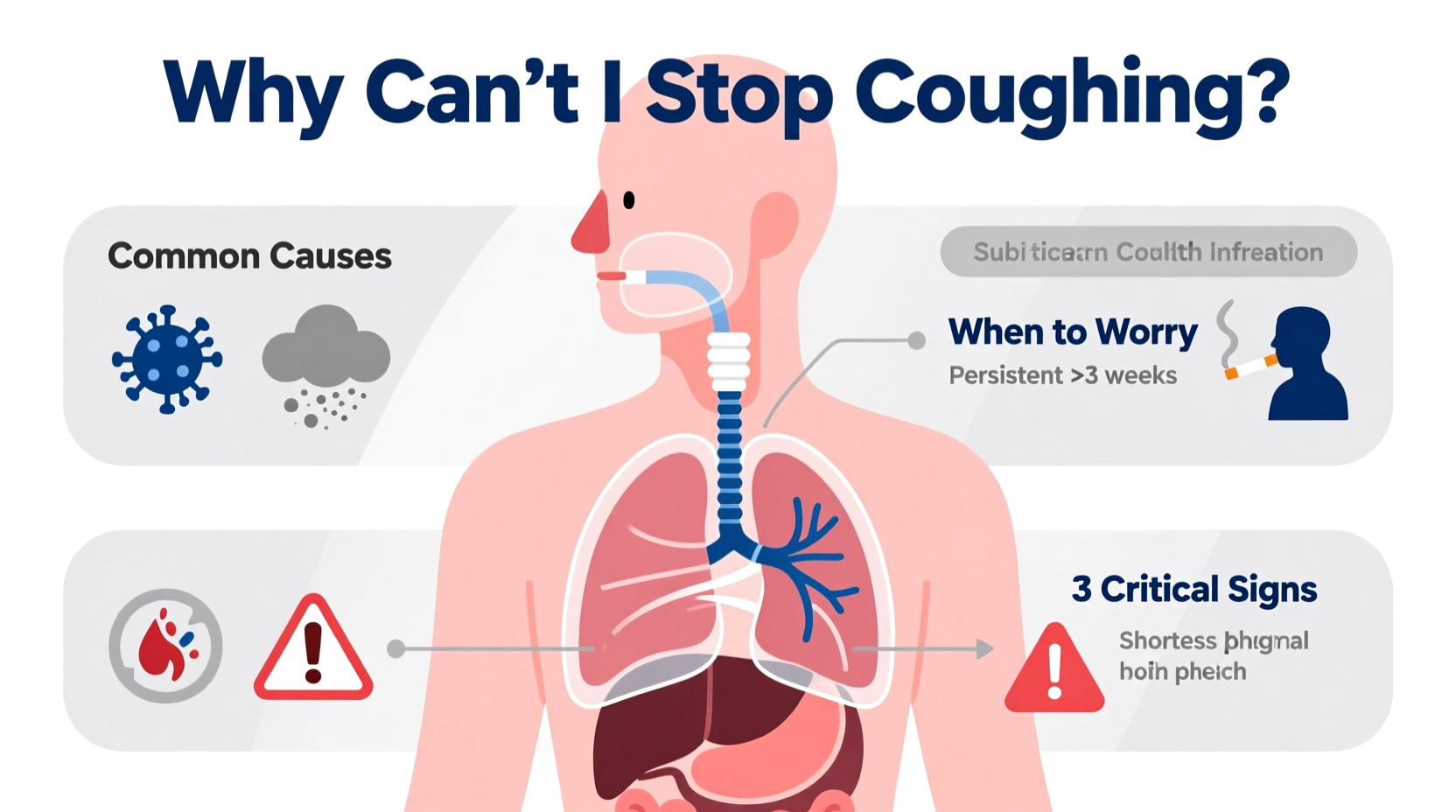A persistent cough can be more than just an annoyance—it can disrupt sleep, affect work performance, and signal an underlying health issue. While most coughs resolve within a few weeks, some linger far longer, leaving people wondering: why can’t I stop coughing? Understanding the root causes, recognizing red flags, and knowing when to seek medical attention are essential steps toward relief and recovery.
Common Causes of a Persistent Cough

Coughing is a natural reflex designed to clear irritants from the airways. However, when it becomes chronic—lasting more than eight weeks in adults or four weeks in children—it often points to an ongoing condition. The most frequent triggers include:
- Postnasal drip: Mucus dripping down the back of the throat from the sinuses is the leading cause of chronic cough. It often worsens at night or upon waking.
- Asthma: Cough-variant asthma presents primarily with a dry, non-productive cough, especially triggered by cold air, exercise, or allergens.
- Gastroesophageal reflux disease (GERD): Stomach acid rising into the esophagus can irritate the throat and provoke coughing, even without heartburn.
- Respiratory infections: Bronchitis, pneumonia, or lingering effects of viral infections like influenza or COVID-19 can prolong coughing for weeks after other symptoms fade.
- Medication side effects: ACE inhibitors, commonly prescribed for high blood pressure, are known to cause a dry, hacking cough in up to 20% of users.
- Environmental irritants: Exposure to smoke, pollution, dust, or strong fragrances can chronically stimulate the airways.
When to Worry: Red Flags That Demand Attention
While many coughs are benign and self-limiting, certain symptoms indicate a need for prompt medical evaluation. Ignoring these warning signs can delay diagnosis of serious conditions.
“Not all coughs are created equal. A cough that persists beyond three weeks, especially with systemic symptoms, warrants investigation.” — Dr. Alan Reyes, Pulmonologist, Massachusetts General Hospital
Symptoms That Require Medical Evaluation
| Symptom | Possible Implication | Action Step |
|---|---|---|
| Coughing up blood (even small streaks) | Bronchitis, infection, or lung pathology | Seek immediate evaluation |
| Shortness of breath or wheezing | Asthma, COPD, or heart issues | Consult a healthcare provider promptly |
| Fever lasting over 5 days | Bacterial infection or pneumonia | Medical assessment needed |
| Unexplained weight loss | Chronic infection, malignancy | Urgent diagnostic workup |
| Night sweats | Tuberculosis or systemic illness | Do not ignore—schedule appointment |
Step-by-Step: What to Do If Your Cough Won’t Go Away
If your cough persists beyond what feels normal, follow this practical timeline to manage symptoms and determine next steps:
- Week 1–2: Monitor symptoms. Stay hydrated, use a humidifier, avoid irritants like smoke, and consider over-the-counter remedies such as honey (for adults) or saline nasal sprays if postnasal drip is suspected.
- Week 3: Evaluate progression. Is the cough improving, worsening, or unchanged? Note any new symptoms like fatigue, chest discomfort, or voice changes.
- Week 4: Schedule a visit with your primary care provider. Bring your symptom log and a list of medications, including supplements.
- Diagnosis phase: Your doctor may order a chest X-ray, spirometry (lung function test), or refer you to a specialist such as an ENT or pulmonologist.
- Treatment initiation: Based on findings, treatment could include inhalers for asthma, antacids for GERD, antibiotics for bacterial infection, or discontinuation of triggering medications.
Real-Life Example: When a Simple Cough Wasn’t So Simple
Sarah, a 42-year-old teacher, developed a dry cough after a mild cold. She assumed it would pass, but four weeks later, she was still coughing frequently, especially at night. She also noticed occasional heartburn but dismissed it. After her cough disrupted her sleep and caused rib pain from forceful episodes, she visited her doctor.
Testing revealed no infection, but a referral to a gastroenterologist confirmed silent GERD—acid reflux without typical heartburn. With lifestyle adjustments and medication, her cough resolved within six weeks. Sarah’s case illustrates how non-respiratory conditions can manifest primarily through coughing, emphasizing the importance of comprehensive evaluation.
Checklist: Assessing Your Chronic Cough
Use this checklist to determine whether your cough requires further medical attention:
- ☐ Has your cough lasted longer than 3 weeks?
- ☐ Are you coughing up blood or rust-colored sputum?
- ☐ Do you experience unexplained fatigue or weight loss?
- ☐ Is your breathing becoming more difficult?
- ☐ Have you started a new medication, especially an ACE inhibitor?
- ☐ Does lying flat worsen your cough?
- ☐ Are you exposed to occupational dust, chemicals, or secondhand smoke?
If you answered “yes” to two or more of these, schedule a medical consultation. Early intervention prevents complications and improves outcomes.
Frequently Asked Questions
Can allergies really cause a long-term cough?
Yes. Allergic rhinitis leads to postnasal drip, which constantly irritates the throat and triggers coughing. This is especially common during pollen seasons or in environments with dust mites, pet dander, or mold.
Is it normal for a cough to last months after a viral infection?
In some cases, yes. Post-viral cough can persist due to airway hypersensitivity. Nerves in the bronchial tubes remain reactive even after the virus clears. This typically resolves within 8 weeks but may require treatment if disruptive.
Could my cough be a sign of lung cancer?
While rare, a persistent cough—especially in smokers or former smokers—can be an early symptom of lung cancer. Other warning signs include hoarseness, chest pain, and coughing up blood. Diagnostic imaging is crucial in high-risk individuals.
Conclusion: Take Control of Your Health
A never-ending cough is not something you should simply endure. Whether it stems from allergies, acid reflux, infection, or medication, identifying the cause is the first step toward effective treatment. Pay attention to your body’s signals, track your symptoms diligently, and don’t hesitate to seek professional guidance when needed.









 浙公网安备
33010002000092号
浙公网安备
33010002000092号 浙B2-20120091-4
浙B2-20120091-4
Comments
No comments yet. Why don't you start the discussion?